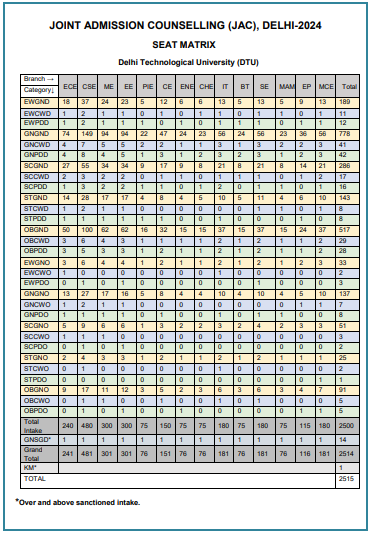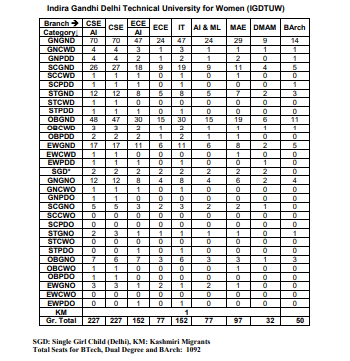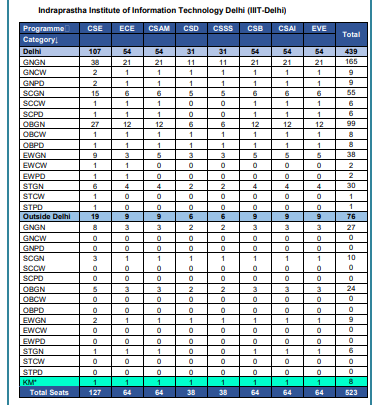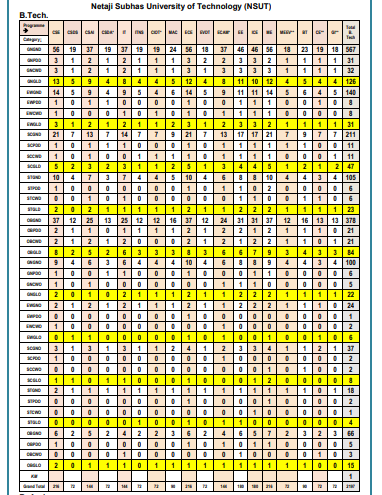Cambridge Institute of Technology B.Tech Admissions 2025
Highest CTC 53.5 LPA | Average CTC 7.2 LPA | 200+ Companies | 790+ Multiple offers
JAC Delhi Counselling 2025 - The JAC Delhi is holding the JAC Delhi spot admission from July 22 to 29, 2025. Candidates who wish to gain admission through spot round of JAC Delhi 2025 counselling must visit the venue. The reporting centre is B.R.Ambedkar Auditorium, Delhi Technological University, New Delhi. The authority announced the revised dates for JAC Delhi spot admission at jacdelhi.admissions.nic.in. The JAC Delhi upgradation round seat allotment was released on July 19, 2025. To download the seat allotment for JAC Delhi, candidates must enter their JEE Main 2025 application number and date of birth. The JAC Delhi 2025 counselling comprises registration, choice-filling, seat allotment and reporting to the allotted institute. JAC Delhi counselling is conducted for admission to several top B.Tech colleges in Delhi.

The revised JAC Delhi 2025 counselling dates have been updated below. The authority announces the JAC Delhi seat allotment for all rounds separately on the official website. For more details, check the article below on JAC Delhi counselling 2025.
The authority has released the JAC Delhi 2025 Counselling dates on the official website. Candidates can check the JAC Delhi 2025 counselling schedule in the table below.
| Event | Dates | Categories |
| Spot round allotment and admission | July 22, 2025 | ST, OBC, EWS category (outside Delhi) |
| July 23, 2025 | SC (outside Delhi), Single girl, ST, SC (Delhi) | |
| July 24, 2025 | OBC, EWS (Delhi) | |
| July 25, 2025 | General (outside Delhi) | |
| July 26, 2025 | General (outside Delhi) | |
| July 28, 2025 | General Defence, General (Delhi) | |
| July 29, 2025 | General (Delhi) |
Events | Dates |
Display of upgraded branch |
|
Seat freezing |
|
Display of vacancy for spot round if any |
|
| Events | Dates |
|---|---|
| Choice Editing for any Modification/Addition in the Preference of Choices | July 3 to 4, 2025 |
Declaration of seat allotment result |
|
Physical Reporting after payment of the seat acceptance fee at the respective institute for document verification (10 AM to 3 PM) | |
Delhi Region: All categories |
|
Outside Delhi Region: All categories |
|
Seat freezing |
|
Withdrawal of admission |
|
| Events | Dates |
|---|---|
Declaration of seat allotment result | July 15, 2025 |
Physical Reporting after payment of the seat acceptance fee at the respective institute for document verification (10 AM to 3 PM) | |
Delhi Region: All categories | July 16, 2025 |
Outside Delhi Region: All categories | July 17, 2025 |
Seat freezing | July 17, 2025 (10:30 PM) |
Events | Dates |
Commencement of JAC Delhi Counselling Registration and Choice Filling (Along with Application Fee Payment) | May 21, 2025 |
Last date for JAC Delhi 2025 counselling registration, fee payment and choice-filling | June 2, 2025 |
Verification of bonus points for IIIT-Delhi | June 4 to 5, 2025 |
Events | Dates |
JAC Delhi 2025 round 1 seat allotment result | June 9, 2025 |
Physical Reporting after payment of the seat acceptance fee at the respective institute for document verification (10 AM to 3 PM) | |
Delhi Region: ST Category Delhi Region: OBC Category with JEE Main 2025 CRL rank up to 80,000 | June 10, 2025 |
Delhi Region: OBC Category with JEE Main 2025 CRL rank above 80,000 | June 11, 2025 |
Delhi Region: SC Category | June 12, 2025 |
Delhi Region: EWS Category | June 13, 2025 |
Delhi Region: CW, PD, SG, KM, sub-categories | June 16, 2025 |
Outside Delhi Region: All Categories | June 17, 2025 |
Delhi Region: GEN Category with JEE Main 2025 CRL rank up to 25,000 | June 18, 2025 |
Seat freezing | June 18, 2025 (10:30 PM) |
Withdrawal of admission | July 8, 2025 (10:30 PM) |
Events | Dates |
New registration and choice-filling | June 19, 2025 (10 AM to 10:30 PM) |
Defence, KM Priority & Bonus Points Verification for newly registered candidates | June 20, 2025 (9 AM) |
JAC Delhi seat allotment for round 2 | June 24, 2025 |
Physical Reporting after payment of the seat acceptance fee at the respective institute for document verification (10 AM to 3 PM) | |
Delhi Region: GEN, OBC, SC and ST Categories | June 25, 2025 |
Delhi Region: EWS Delhi Region: SG, CW, KM, PD sub-categories | June 26, 2025 |
Seat freezing | June 26, 2025 (10:30 PM) |
Withdrawal of admission | July 8, 2025 (10:30 PM) |
Declaration of seat allotment result | June 30, 2025 |
Physical Reporting after payment of the seat acceptance fee at the respective institute for document verification (10 AM to 3 PM) | |
Delhi Region: GEN, OBC, SC and ST Categories | July 1, 2025 |
Delhi Region: EWS Delhi Region: SG, CW, KM, PD sub-categories | July 2, 2025 |
Seat freezing | July 2, 2025 (10:30 PM) |
Withdrawal of admission |
|
The authorities conducted the round 4 JAC Delhi 2025 choice filling process from July 3 to 4, 2025. As it is an important process for B.Tech admissions in Delhi, candidates may refer to the steps below:
Candidates need to visit the official JAC Delhi website at jacdelhi.nic.in and click on the link to JAC Delhi counselling 2025. A further process is explained below step by step:
Fee Payment: First of all, candidates have to pay the requisite counselling fee of Rs 1500 for participating in the JAC Delhi 2025 counselling. The same can be paid online or offline as convenient for candidates. To pay the counselling fee, candidates have to login to the online portal after registration by entering JEE Main application number 2025 and name. Candidates can make the payment through credit/ debit card or net banking through the respective payment gateway. Candidates will also be able to pay the JAC Delhi counselling fee in offline mode through e-challan.
Registration: After paying the counselling fee, candidates have to proceed with JAC Delhi counselling registration. Candidates will be able to check the JAC Delhi registration date on this page. Given below are the details to be entered by candidates:
Roll number of JEE Main 2025
JEE Main 2025 application number
Name of the candidate
Candidate’s date of birth
Academic information
Personal details
Contact Details
Scanned signature and photograph
Choice Filling: After successful registration, candidates need to fill the choice of course and colleges during JAC Delhi 2025 counselling. Candidates are advised to select as many options as possible to have a better chance of getting admission. During the specified period, candidates have to lock the choices entered and take a print of the choices selected for future reference. Those who miss out on locking the choices may note that the choices will be automatically locked after the period ends.
Seat Allotment: The authorities has announced the JAC Delhi 2025 round 5 seat allotment on July 15, 2025. Candidates are allotted seats based on the All India Rank (merit list) as prepared by the admission authority. Allotment of seats based on choices entered, merit rank secured, availability of seats, and more. Candidates who are allotted a seat have to download their provisional JAC Delhi allotment letter from the official website. To confirm the allotted seat, they have to pay a seat acceptance fee of Rs. 75,000 through online mode or SBI Challan at any SBI Branch before reporting.
Reporting at Allotted Institute: Candidates allotted seats during JAC Delhi counselling 2025 have to report to the allotted institute with the required documents. Candidates who do not accept admissions through provisionally allotted seats will not be allotted any seat in the further rounds of JAC Delhi 2025 counselling. Such candidates may wait for the JAC Delhi spot round 2025.
Candidates need the following documents while reporting at the institute allotted through JAC Delhi 2025 counselling:
JAC Delhi online registration form
Fee receipt of Rs. 10,000
Demand Draft of Rs. 85,000 drawn in favour of “JAC DELHI ADMISSION FEE” payable at New Delhi
Candidate’s three passport-size photographs
JEE Main 2025 admit card and score card.
Marksheet of the qualifying examination
Date of Birth certificate or high school passing certificate
Reserved category / sub-category certificate (if applicable).
Medical fitness certificate in original (General/ SC/ ST/ CW/ OBC/ SG/ TP/ CW/ KM candidates)
PD sub-category
The authority released the JAC Delhi 2025 round 1, 2, 3, 4 and 5 cutoffs round-wise in online mode. Candidates can find the JAC Delhi 2025 cutoffs for various rounds below.
The authorities will release the institute-wise seats offered for JAC Delhi admissions through the seat matrix. Candidates can check the JAC Delhi 2025 seat matrix for all the the participating institutes below, when released. In the meantime, candidates can check the JAC Delhi previous year seat matrix below




Frequently Asked Questions (FAQs)
The JAC Delhi 2025 counselling began on May 21, 2025.
Yes, candidates can apply for JAC Delhi 2025 admission using their JEE Main 2025 scores.
India's Largest University | NAAC A++ | 100% Placements Record | Highest CTC 2.5 Cr PA | 150 + Programmes across Multiple Disciplines
Ranked #43 among Engineering colleges in India by NIRF | Highest Package 1.3 CR , 100% Placements
AICTE ‘Platinum’ institute | NIRF 2024 Rank Band 151-200 under the engineering category | Tier-1 accreditation by NBA | Merit & Sports Scholarships
Dive into everything you need to know about IITs—from eligibility and cutoffs to fees and placements.
Hands on Mentoring and Code Coaching | Cutting Edge Curriculum with Real World Application
1000+ Recruiters | 450+ Patents | 50000+ Alumni network